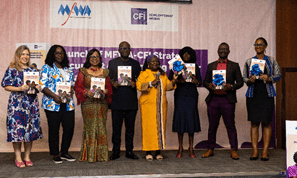By Deborah Asantewaah SARFO
Despite its advocacy for gender equity, the Fourth Estate continues to struggle with the same issues.
In addressing these matters within the media landscape, the Media Foundation for West Africa (MFWA) has taken a bold step by introducing a strategic document to promote gender equity in media.
It addresses issues such as underrepresentation of women in leadership, media content among others. Additionally, it aims at equipping both male and female journalists to address the unbalanced nature of presentation in media narratives.
The document is a product of vigorous engagement, research and reflection by MFWA with support from Canal France International (CFI). It forms part of the ‘Equal Voices Project’ implemented by MFWA and CFI.
According to Senior Programme Manager-Media for Democracy and Good Governance, MFWA, Rosemond Ebi-Adwo Aryeetey, the project was born out of research conducted by CFI in 2020-2021, focusing on gender equity and representation in Africa – specifically in four different countries: Ghana, Niger, Côte d’Ivoire and DR Congo.
However, over the last two years (2023 -2025) the project has been running in Ghana and Côte d’Ivoire.
She indicated that the strategy document is replete with inputs from diverse views across academia, policymakers, media associations and journalists – reflecting the role of action and collaboration among key stakeholders in pushing for a gender equity agenda.
Ms. Aryeetey therefore concluded that “gender equity is more than just commitment or policies. It is about action and collaboration”.
She noted that the document aligns with MFWA’s strategic pillar for women empowerment and CFI’s core values. On both the national and international front, it is in line with the Affirmative Action law and Sustainable Development Goal (SDG) five.
The project’s Lead Consultant, Dr. Charity Binka who doubles as Executive Director of Women and Change (WOMEC), mentioned that across media institutions in the country, fewer than 30 percent of leadership roles are held by women and fewer advance to top positions such as editor-in-chief, managing director or CEO and others.
She noted that the document includes anti-harassment and sexual harassment frameworks; policies that support maternity and reproductive health; ensures flexible workplace arrangements for parents and caregivers; and accessible and confidential reporting mechanisms for gender-based violence and harassment.
Ms. Binka urged owners of various media outlets in the country to implement the policies and organise workshops to build the capacity of journalists and managers to understand gender inequity-related issues.
Speaking at the launch, Cooperation Attachée at the French Embassy, Marine Hayem, addressed the document’s unique approach to the realities shared by stakeholders and the action plan outlined in the document, providing operational steps with specific timelines and activities.
“I think what sets this strategy apart is that it’s not close to the theoretical document, it is grounded in realities and the action plan provides clear and operational steps with specific timelines and activities – which is important,” she said.
She also underscored the role of media in shaping societies, their people and policies; emphasising that “Equity is not just a matter of fairness, rather, it deeply impacts the quality of democracy”.
In a speech read on his behalf, President-Ghana Journalist Association (GJA), Albert Kwabena Dwumfour outlined some practical steps media outlets must take to promote gender equity in the sector.
These steps increase women’s representation and strive for parity in hiring processes, encouraging culture inclusivity to reporters. He urged them to seek out diverse source perspectives and ensure that women’s voices and experiences are amplified.
He stressed that achieving gender equity in media houses is not only a moral imperative but “a necessary step toward creating a more just and equitable society”.










